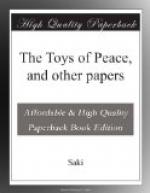“I can’t say I admire the climbing putella,” she observed shortly, “and anyway it’s not the only one of its kind in England; I happen to know of one in Hampshire. How gardening is going out of fashion; I suppose people haven’t the time for it nowadays.”
Altogether it was quite one of Elinor’s most successful luncheon parties.
It was distinctly an unforeseen catastrophe that Gwenda should have burst in on the household four days later at lunch-time and made her way unbidden into the dining-room.
“I thought I must tell you that my Elaine has had a water-colour sketch accepted by the Latent Talent Art Guild; it’s to be exhibited at their summer exhibition at the Hackney Gallery. It will be the sensation of the moment in the art world—Hullo, what on earth has happened to your garden? It’s not there!”
“Suffragettes,” said Elinor promptly; “didn’t you hear about it? They broke in and made hay of the whole thing in about ten minutes. I was so heart-broken at the havoc that I had the whole place cleared out; I shall have it laid out again on rather more elaborate lines.”
“That,” she said to the Baroness afterwards “is what I call having an emergency brain.”
THE SHEEP
The enemy had declared “no trumps.” Rupert played out his ace and king of clubs and cleared the adversary of that suit; then the Sheep, whom the Fates had inflicted on him for a partner, took the third round with the queen of clubs, and, having no other club to lead back, opened another suit. The enemy won the remainder of the tricks—and the rubber.
“I had four more clubs to play; we only wanted the odd trick to win the rubber,” said Rupert.
“But I hadn’t another club to lead you,” exclaimed the Sheep, with his ready, defensive smile.
“It didn’t occur to you to throw your queen away on my king and leave me with the command of the suit,” said Rupert, with polite bitterness.
“I suppose I ought to have—I wasn’t certain what to do. I’m awfully sorry,” said the Sheep.
Being awfully and uselessly sorry formed a large part of his occupation in life. If a similar situation had arisen in a subsequent hand he would have blundered just as certainly, and he would have been just as irritatingly apologetic.
Rupert stared gloomily across at him as he sat smiling and fumbling with his cards. Many men who have good brains for business do not possess the rudiments of a card-brain, and Rupert would not have judged and condemned his prospective brother-in-law on the evidence of his bridge play alone. The tragic part of it was that he smiled and fumbled through life just as fatuously and apologetically as he did at the card-table. And behind the defensive smile and the well-worn expressions of regret there shone a scarcely believable but quite obvious self-satisfaction. Every sheep




